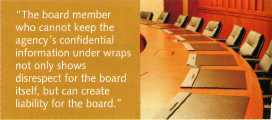 |
Home | Search | Browse | About IPO | Staff | Links |
 |
Home | Search | Browse | About IPO | Staff | Links |
|
GET ON BOARD  The business of your agency is public business that, generally, the public has the right to know. However, there are certain matters, such as personnel issues and details of contracts that are still under negotiation, that should not be revealed to the public. (In fact, as your agency's attorney can advise you, there are legal prohibitions against releasing this type of information.) Board members certainly need to be clear about which information is privileged and which information can be made public. And, when making information public, board members need to know to deal with the media so that their agency's message can get to the people accurately. Breaches of Confidentiality How do boards reinforce the principle of confidentiality to their members and who is responsible for fixing a problem like this: the board or the executive director? Clearly, dealing with a situation like this is a responsibility the board can't delegate. It's not the director's job to deal with inappropriate behavior of a board member. It's the board's job. While confronting a fellow board member may be difficult, not doing so will jeopardize the integrity of the entire board. One way to address the importance of maintaining confidentiality is to develop a set of norms. The board needs rules that reinforce the importance of confidentiality, and then the board needs to enforce those rules. Here are options from a sampling of agencies: • Develop operating norms to create a commitment to act in a professional manner. Include a statement about board confidentiality in the document. • Address confidentiality in a board conduct policy. If members understand what information they may properly keep under Wraps, they likely will respect the confidentiality appropriate to issues of a sensitive nature, and they will respect the confidentiality of an executive session. • Consider penalties. In your board conduct policy, you may prescribe "formal action" against a member who violates the policy. This can include, as allowed by law, a verbal reprimand, censure or recommend removal from the board or committee position. Dealing with the Media To achieve a consistent and reliable voice for the agency, some boards prefer the executive to be the agency spokesperson and the president to serve as an alternate spokesperson. Other boards have the executive and president share the responsibility. 
If the president is comfortable with the media and experienced in public relations, boards are more likely to use the president as the spokesperson for the board, while the executive remains the spokesperson for the agency or for matters that are not related to board policy. The best general guidelines for board members dealing with the media are to: 1. Agree on a unified board position, and 2. Agree on a board spokesman and refer reporters to the designated spokesman. "An agency should do its best to help reporters get reliable and timely 6 Illinois Parks & Recreation www.ILipra.org How to be an Effective Spokesperson When working with the media: • Become informed about your agency (services, strategic plan, goals, legislation etc.). • Learn and live by your agency's policies and procedures for dealing with the media. Know who on staff is responsible for day-to-day media relations. • It is not always necessary to respond immediately. Make sure you have all the facts. Tell the reporter you need to get more information before you can accurately comment on the issue. • Support the board's decisions when talking with the media. • Be polite to reporters. Treat them with professional respect. • Treat all reporters equally. • Remember: Nothing is "off the record." The call: • Always take a reporter's call. If you are not prepared to respond, ask the reporter if you can call back. Ask what the deadline is, then call the reporter back so he or she can make the deadline. • Never say "no comment." The interview: • State your key points first and be concise. • Honesty is always best. If you don't know an answer, say so. But offer to find out. • Don't assume the reporter knows anything about the story. Restate the key points. • Volunteer important information. Don't wait for a reporter to ask the question. Reporters appreciate information that adds to the story and leads to further questions. IAPD/IPRA Soaring to New Heights Conference January 24-26 Hyatt Regency - Chicago
SOME SESSIONS OF INTEREST TO COMMISSIONERS
www.ILparks.org January/February 2008 7 |Home|
|Search|
|Back to Periodicals Available|
|Table of Contents|
|Back to Illinois Heritage 2008|
|